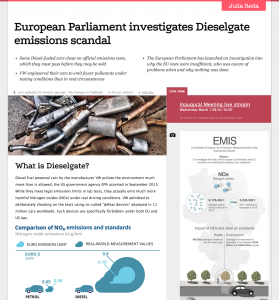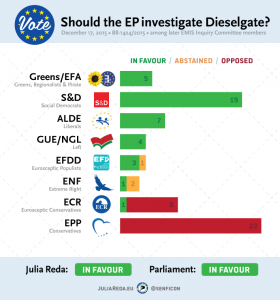The European Parliament is finally starting its investigation into the Dieselgate emissions scandal, in which millions of cars by VW were found to be cheating on emissions tests, massively exceeding the limits for pollutants in actual driving conditions even after supposedly acing their approval procedures.
The Committee of Inquiry, of which I am a member, is taking up its work this morning and will be meeting for a year. Even after it was instituted by a 61% majority in December, today’s start was delayed multiple times. Clearly, certain people would prefer not to investigate: Of the very members now tasked with investigating the scandal, many voted against conducting it at all last December – including every last one of the Conservatives (EPP) and all but one of the Committee members from of the eurosceptic, conservative ECR group.
Dieselgate illustrates larger problems
The scandal points to several larger issues of critical importance to society:
- Why are we failing to more quickly phase out fossile fuels that continue to pollute our environment and affect our health?
- Are the lawmaking process and the enforcement of existing rules being undermined by too-comforable relationships between industry and politics?
- How does our economic system incentivise a major corporation to cheat, rather than comply with essential safety rules?
- Is the public losing oversight and control of technology that increasingly impacts our lives?
It is that last point that I will make the centerpiece of my role on the Committee, as part of my mission to make technology benefit everyone in Europe, not just the few. I see Dieselgate as a canary in the coal mine of software autonomy.
Copyright & trade secrets privilege corporate control overhuman rights, autonomy and safety. Tweet this!
As computerisation forges ahead, we are increasingly losing the right to inspect (and, if necessary, modify) the products and devices we own and which surround us ever more closely. Laws on copyright and trade secrets protect things we bought and paid for from our own eyes and hands. Corporate interests to keep control over and profit from technology are privileged over people’s human rights, autonomy and safety. As a result, it goes undetected when software that affects our everyday lives cheats, spies or puts us at risks with security flaws.
In an interview last November, the CEO of TÜV Nord, one of the main companies tasked with testing and approving vehicles in Germany, stated that they were prohibited from investigating engine control software to look for cheating behavior, as the German government had classified it a trade secret.
In addition, even if the code were accessible, there is currently no way of ensuring that the software that runs on a test car provided by the manufacturer is the same that runs on the fleet later sold on the market.
Even new, future testing procedures recently proposed to Parliament by the European Commission stand to continue treating the car’s software as a black box, rather than an integral and security-critical part that must be open to public scrutiny regardless of corporations would prefer to keep secrets.
makING the Inquiry easy to follow
 My team and I will be enabling you to follow the Committee’s progress at dieselgate.felixreda.eu starting today. Tweet this!
My team and I will be enabling you to follow the Committee’s progress at dieselgate.felixreda.eu starting today. Tweet this!
On this site, we will both be live blogging meeting highlights (right column) and continuously updating an easy-to-understand overview of the Committee’s background, status and findings (left column). I’ll also be making all related documents transparent to the extent that I can do so legally.
Whenever you visit the page, you will find the changes since your last visit highlighted – so you can stay up to date at whatever frequency suits you. You can also subscribe to daily or weekly email updates of changes. If there are aspects you would like clarified or expanded on, you may use the Q&A function at the bottom of the page.
This is powered by the experimental open source journalism software Luminous Flux. Please note that features like optimisation for mobile reading are still missing, and that it’s generally a little rough around the edges – the site will be improved alongside its content.
I hope you will stay engaged and join me in investigating and then laying out a future regulatory path to ensure that it will be society as a whole and every individual in it who control and benefit from technological progress, and not just some corporations.
To the extent possible under law, the creator has waived all copyright and related or neighboring rights to this work.
